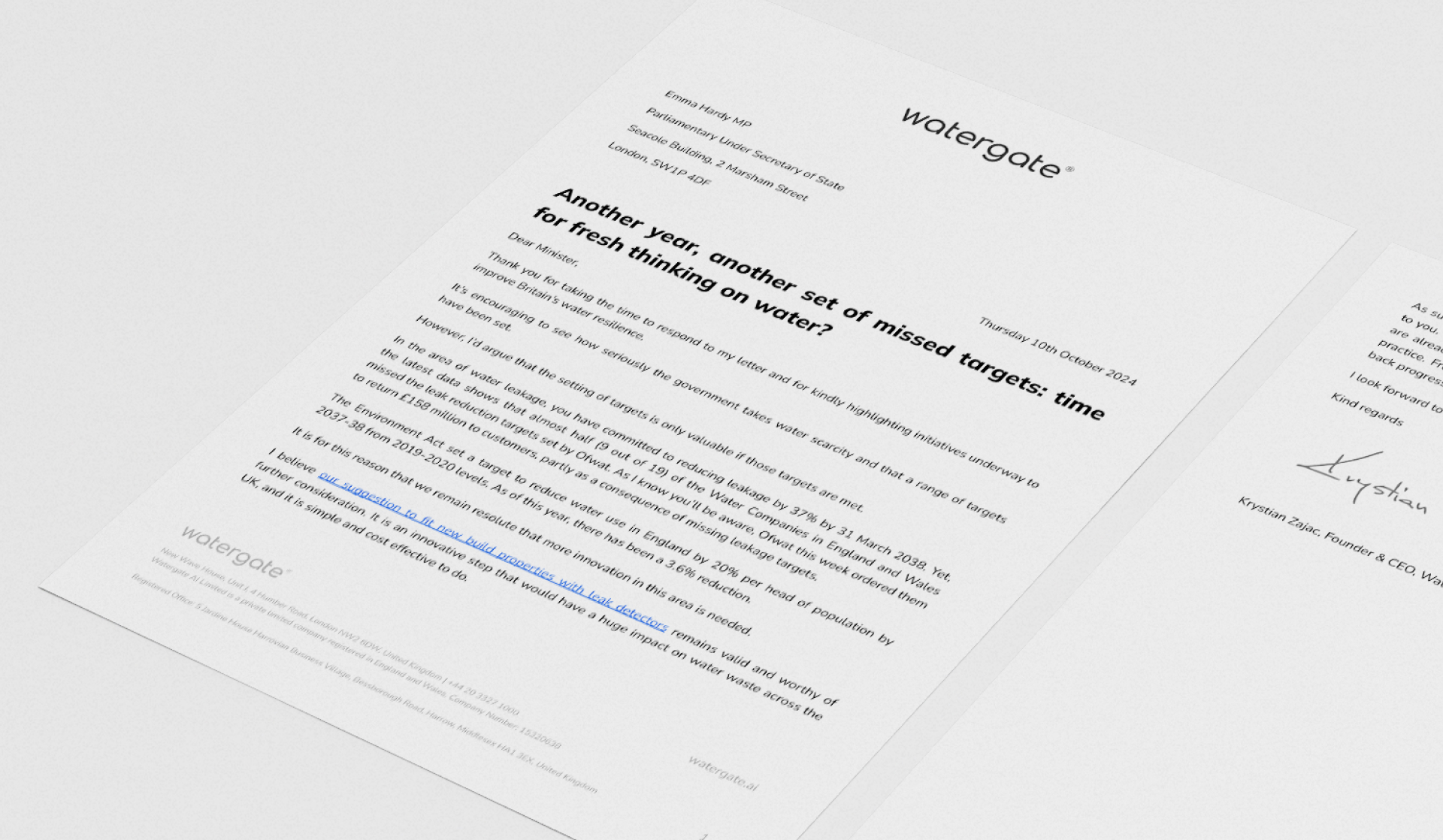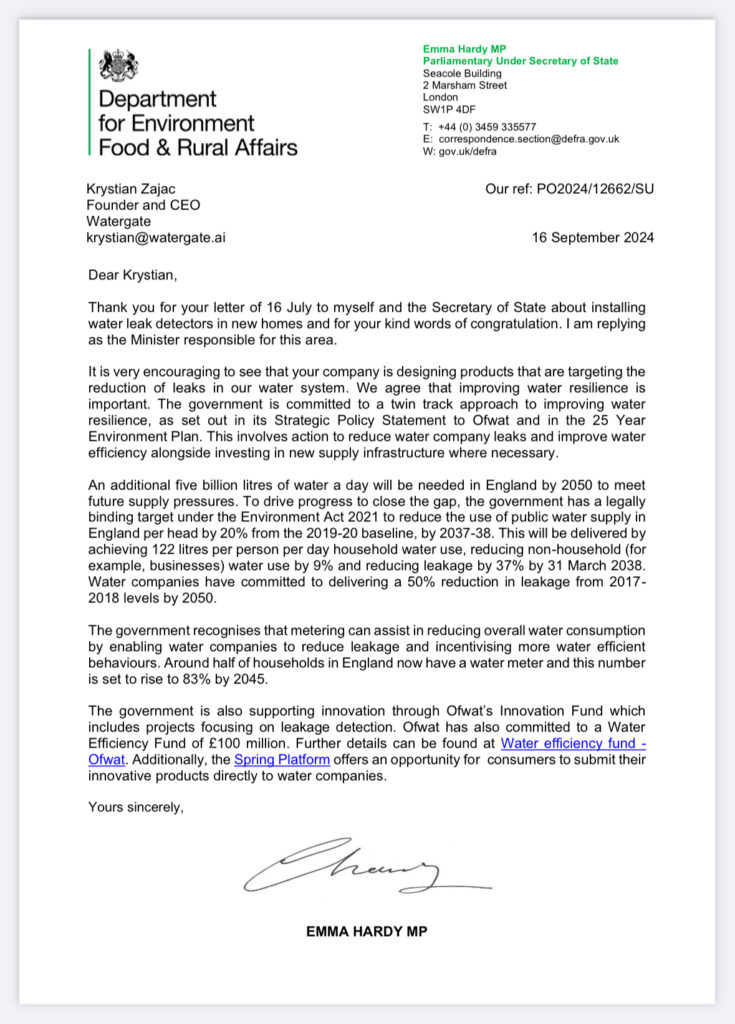Another year, another set of missed targets: time for fresh thinking on water?

“When it is obvious that the goals cannot be reached, don’t adjust the goals, adjust the action steps.”
Sage words of advice from Confucius, which perhaps the UK government should heed with respect to addressing water scarcity?
You might recall that we wrote to the new Labour government in the summer and asked them to take urgent action on water wastage.
We pointed out that climate change and population growth means the UK is facing a water scarcity crisis and we’ll need additional supplies of water equivalent to London’s consumption by 2035.
Emma Hardy MP has kindly replied in her capacity as Parliamentary Under Secretary of State at Defra, with responsibility for water.
We have published her full response, and how we replied, below.
To be fair, the Minister clearly has a strong grasp of the severity of the issue. But the Government’s line seems to be ‘we set targets for others to meet’.
Targets and goal setting are, of course, very important. The trouble is that when it comes to water, successive governments, Ofwat and the Water Companies don’t have an amazing track record of hitting them.
For example, the latest data on water leak reduction for England and Wales shows that almost half of the water companies missed the target set for them by Ofwat.
So whilst we applaud Defra’s grasp of the problem, we believe they could – and should – be doing far more to solve it.
We maintain that it should be mandatory to fit a leak detector in every newly built home in Britain. As we previously explained, this would combat water waste and boost sustainability, whilst also protecting people and properties.
It seems nonsensical not to take this action. It became mandatory to fit smoke alarms in new UK dwellings in 1991. More than thirty years later, we’re yet to take similar steps to prevent water waste in properties.
At Watergate, we’re not going to stop fighting for change.
We will keep questioning the status quo and making suggestions to the Government alongside our partners. And we will keep innovating – finding new ways to make detecting leaks and conserving water easier than ever before – check out our roadmap to get a sneak peak at what we’re working on right now.
Stay tuned!
The response from Emma Hardy MP:

Our response
To:
Emma Hardy MP
Parliamentary Under-Secretary of State
Department for Environment, Food and Rural Affairs
10 October 2024
Another year, another set of missed targets: time for fresh thinking on water?
Dear Minister,
Thank you for taking the time to respond to my letter and kindly highlighting initiatives underway to improve Britain’s water resilience.
It’s encouraging to see the government does take water scarcity seriously, and is taking steps in the right direction.
However, I’d argue that the setting of targets is only valuable if those targets are met.
In the area of water leakage, you have committed to reducing leakage by 37% by 31 March 2038. Yet, the latest data shows that almost half (9 out of 19) of the Water Companies in England and Wales missed the leak reduction targets set by Ofwat. As I know you’ll be aware, Ofwat this week ordered them to return £158 million to customers, partly as a consequence of missing leakage targets.
The Environment Act set a target to reduce water use in England by 20% per head of population by 2037-38 from 2019-2020 levels. As of this year, there has been a 3.6% reduction.
It is for this reason that we remain resolute that more innovation in this area is needed.
We believe new homes need to be fitted with leak detectors as standard. This one step would save billions of litres of water. It’s simple and cost-effective, with no cost to taxpayers, and those installing the system would see a return on investment in as little as 18 months.
It’s evident that water utilities aren’t delivering on their targets, and there is a very clear conflict of interest at the heart of it. They’re not responsible for water leaks inside our properties. Even more – they profit from them because we pay for all water used after their meter (which is at the boundary of our homes).
And here’s one more thing, and this is a smoking gun of water wastage that almost nobody is taking into consideration. One cubic metre of water used or wasted is the equivalent of 10.4kg of CO2e—which is the same as burning 4.4 litres of petrol. Ensuring we finally address leaks and wastage wouldn’t just help ease water stress, but it would also contribute to the reduction of the nation’s carbon footprint in a very meaningful way. This is yet another reason why I urge you to re-evaluate your approach to mandating leak detection systems in all new builds.
I would like to invite you or one of your team to meet with us at a time and location convenient to you. We would be delighted to share more about what is possible, give examples of developers who are already on-board with proactive leak detection, and discuss how a national initiative might work in practice. From our side, we’d love to hear your perspective too, with regard to anything that might hold back progress in this area.
I look forward to hearing from you.
Yours sincerely,

Krystian Zajac, Founder and CEO, Watergate
watergate.ai
